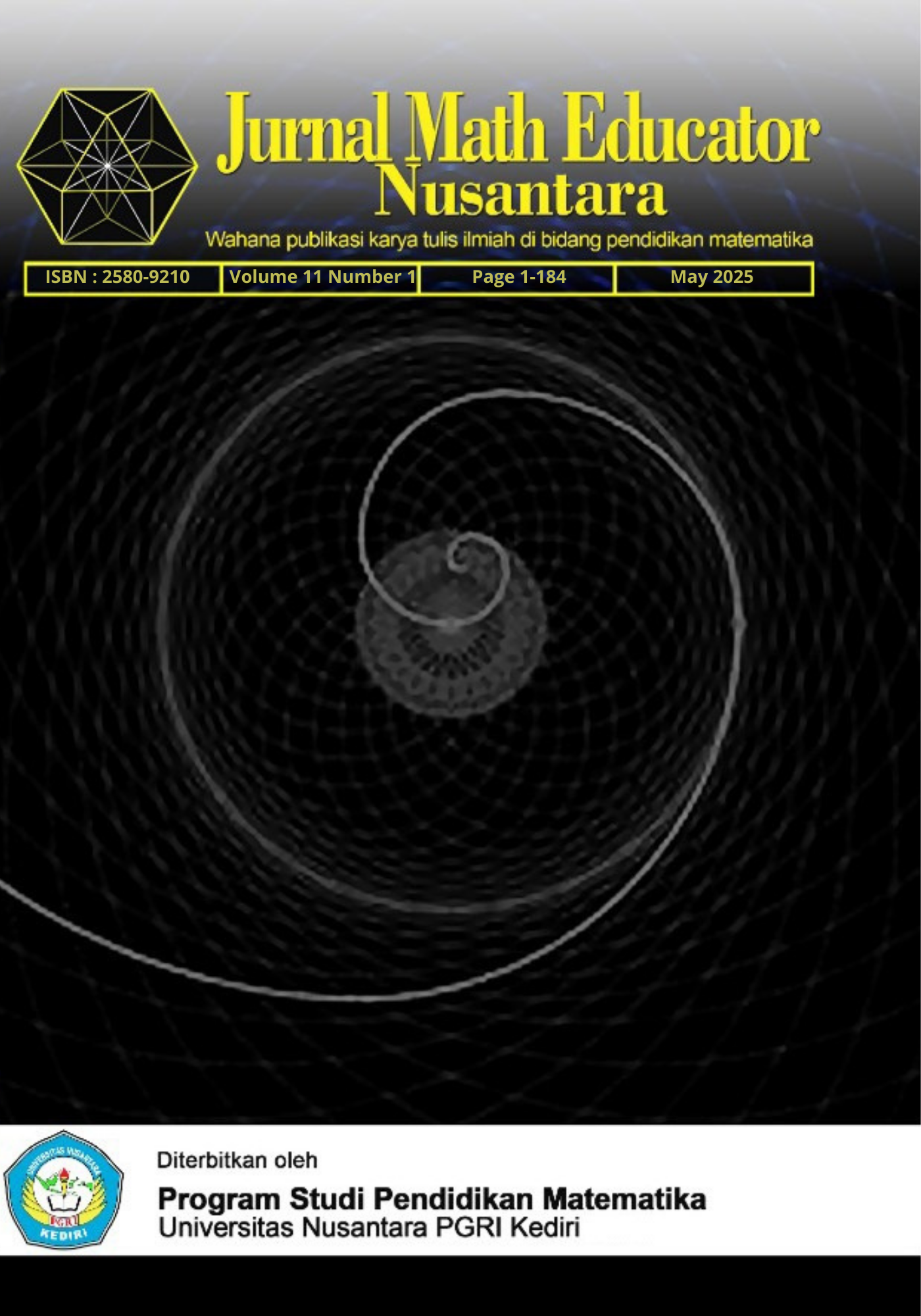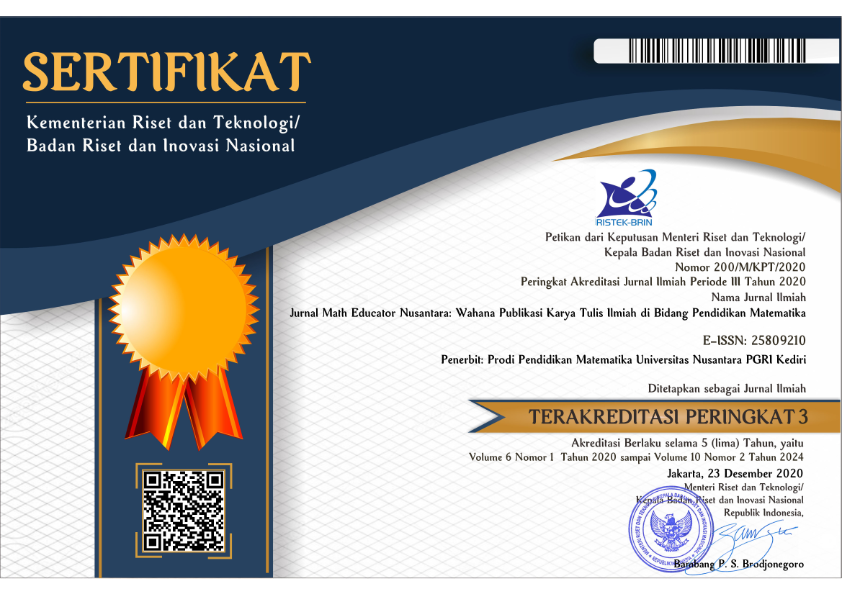The effect of the realistic mathematics education (RME) approach to understanding the mathematical concepts of students
DOI:
https://doi.org/10.29407/jmen.v11i1.25223Keywords:
Mathematic, Realistic Mathematics Education, Conceptual understandingAbstract
The low ability to understand this concept is because students are less able to explain or re-express the concepts they get. One of the approaches to learning mathematics that is applied to overcome the low ability to understand students' mathematical concepts is the Realistic Mathematics Education (RME) approach. The Realistic Mathematics Education (RME) approach is one approach in the mathematics learning process to make it easier for students to absorb material and their experiences directly which are focused on placing problems found in daily activities. This study aims to determine the effect of the Realistic Mathematics Education (RME) approach on Students' Mathematical Concept Understanding. This type of research is a quasi-experimental study and the design used is the pretest-posttest control group design. The population in this study were all students of class VIII of SMP Negeri 6 Percut Sei Tuan. The research sample was taken randomly as many as 2 classes, the research instrument used a test. Data analysis was carried out using the T test. The results of this study indicate that there is an effect of the realistic mathematics education (RME) approach on students' mathematical concept understanding.
References
Aprilianto, M. F., & Sutarni, S. (2023). Peningkatan kemampuan berpikir kritis dengan pembelajaran matematika berbasis Realistic Mathematic Education (RME) pada siswa sekolah dasar. Jurnal Basicedu, 7(1), 807–815. https://doi.org/10.31004/basicedu.v7i1.4643
Cahani, K., Effendi, K. N. S., & Munandar, D. R. (2021). Kemampuan Pemahaman Konsep Matematika Siswa Ditinjau Dari Konsentrasi Belajar Pada Materi Statistika Dasar. Pembelajaran Matematika Inovatif, 4(1), 215–224. https://doi.org/10.22460/jpmi.v4i1.215-224
Fauzan, A. (2002). Applying Realistic Mathematics Education (RME) in teaching geometry in Indonesian primary schools.
Fauzi, L. M., Gazali, M., Fauzi, A., Wardi, Z., & Endriana, N. (2022). Realistic mathematics education: Building mathematical conceptions in sasak culture. Jurnal Math Educator Nusantara: Wahana Publikasi Karya Tulis Ilmiah Di Bidang Pendidikan Matematika, 8(2), 155-167. https://doi.org/10.29407/jmen.v8i2.18885
Ginting, S. M. B., & Rakhmawati, F. (2024). The Influence of Realistic Mathematics Education (RME. Model Based on Ethnomathematics of Engklek Game on Students' Mathematical Problem Solving Abilities. Prisma Sains : Jurnal Pengkajian Ilmu Dan Pembelajaran Matematika Dan IPA IKIP Mataram, 12(3), 428–438. https://doi.org/10.33394/j-ps.v12i3.11905
Gravemeijer, K. (2008). RME Theory and Mathematics Teacher Education. In International Handbook of Mathematics Teacher Education (Vol. 1 283, pp. 283–302).
Hasibuan, A. N. S., & Hasibuan, E. K. (2023). Analisis Kemampuan Komunikasi Siswa Dengan Metode Pendekatan Realistis Mathematic Education (RME. At Turots: Jurnal Pendidikan Islam, 5(1), 146–156. https://doi.org/10.51468/jpi.v3i1.56
Hasibuan, D., Asrul, A., & Siregar, M. A. P. (2024). Pengaruh Penggunaan Aplikasi Desmos Graphing Calculator Terhadap Kemampuan Pemahaman Konsep Matematis Siswa. Jurnal Arjuna : Publikasi Ilmu Pendidikan, Bahasa Dan Matematika, 2(5), 60–68. https://doi.org/10.61132/arjuna.v2i5.1177
Hidayati, K. (2013). Pembelajaran Matematika Dengan Pendekatan Pendidikan Matematika Realistik Indonesia (Pmri) Di Sd/Mi. Cendekia: Jurnal Kependidikan Dan Kemasyarakatan, 11(1). https://doi.org/10.21154/cendekia.v11i1.397
Kartika, H. (2018). Implementasi pendekatan Realistic Mathematics Education (RME) dalam pembelajaran matematika. Jurnal Sesiomadika, 1(2), 72–80.
Lende, E. N., & Wirawan, I. D. G. K. (2022). Pengaruh Pemanfaatan Teknologi Dan Kebiasaan Belajar Terhadap Hasil Belajar Ekonomi Siswa Kelas Xi Ips Sma Negeri 6 Denpasar Tahun Pelajaran 2021/2022. Arthaniti Studies, 3(2), 81–86. https://doi.org/10.5281/zenodo.7122255
Lubis, M. S. (2019). Pengaruh Pendekatan Pembelajaran Realistic Mathematics Education dan Contextual Teaching Learning terhadap Pemahaman Konsep dan Komunikasi Matematis. Logaritma : Jurnal Ilmu-Ilmu Pendidikan Dan Sains, 7(2), 239–252.
Lubis, N. A., & Rahmadhani, E. (2023). Analisis Kemampuan Pemahaman Konsep Siswa Pada Materi Program Linier. AXIOM ; Jurnal Pendidikan Matematika Dan Matematika, 12(2), 226–240. https://doi.org/10.30821/axiom.v12i2.18077
Lutfiah, E., Saputra, E., & Maysarah, S. (2023). Analisis Kemampuan Pemecahan Masalah Siswa Menggunakan Bahan Ajar Berbasis Realistic Mathematic Education. Relevan : Jurnal Pendidikan Matematika, 3(5), 553–558.
Mashuri, M. (2023). Penerapan Rme Untuk Meningkatkan Aktivitas Dan Hasil Belajar Siswa Di Kelas Vi Min 11 Tabalong. EDUCATOR : Jurnal Inovasi Tenaga Pendidik Dan Kependidikan, 3(1), 60–69. https://doi.org/10.51878/educator.v3i1.2189
Mauliandri, R., Maimunah, M., & Roza, Y. (2021). Kesesuaian Alat Evaluasi Dengan Indikator Pencapaian Kompetensi Dan Kompetensi Dasar Pada RPP Matematika. Jurnal Cendekia : Jurnal Pendidikan Matematika, 5(1), 803–811. https://doi.org/10.31004/cendekia.v5i1.436
Musto'inah, D., T, A., & Sary, R. M. (2023). Analisis Kesulitan Siswa Dalam Pemahaman Konsep Matematika Di Tinjau Dari Perbedaan Gender Di Sekolah Dasar. Prosiding Sendika, 4(1), 318–332.
Nadhira, & Karo-Karo, I. R. (2019). Pengaruh Strategi Pembelajaran Kooperatif Tipe Cooperative Script Dan Strategi Problem Based Learning Terhadap Kemampuan Pemahaman Konsep dan Pemecahan Masalah Matematis Siswa Kelas XI Pada Materi Program Linier SMA Negeri 1 Tanjung Pura T.P 2018-2019. AXIOM : Jurnal Pendidikan Dan Matematika, 8(2), 171–186.
Napitupulu, S., & Siregar, T. J. (2019). Meningkatkan Pemahaman Konsep Dengan Pembelajaran Matematika Realistik (PMR) Pada Materi Matematika Dasar Satu Tahun Ajar 2017/2018. Prosiding Seminar Nasional Hasil Penelitian, 2(1), 786–791.
Nasution, L. R. I. F., Neliwati, & Andhany, E. (2022). The Effect Of A Realistic Mathematics Approach On Students' Mathematical Critical Thinking Ability. Mahir : Jurnal Ilmu Pendidikan Dan Pembelajaran, 1(2), 267–275.
O.e.c.d. (2023). PISA 2022 Results Factsheets Indonesia. OECD (Organisation for Economic Co-Operation and Development. Publication, 1–9. https://www.oecd.org/en/publications/pisa-2022-results-volume-i-and-ii-country-notes_ed6fbcc5-en/indonesia_c2e1ae0e-en.html
Primasari, I. F. N. D., Zulela, Z., & Fahrurrozi, F. (2021). Model Mathematics Realistic Education (Rme) Pada Materi Pecahan Di Sekolah Dasar. Jurnal Basicedu, 5(4), 1888–1899. https://doi.org/10.31004/basicedu.v5i4.1115
Radiusman. (2020). Studi literasi: pemahaman konsep siswa pada pembelajaran matematika. 6, 1–8.
Ramadiana, A. (2024). Permasalahan kemampuan pemahaman konsep matematika pada materi bangun ruang sisi datar serta alternatif penyelesaiannya.
Sahir, S. H. (2022). Metodologi Penelitian. KBM Indonesia.
Saleh, M., & Saleh, M. S. M. (2012). Pembelajaran kooperatif dengan pendekatan pendidikan matematika realistic (PMR. Jurnal Serambi Ilmu, 13(2), 51–59.
Sari, A., & Yuniati, S. (2018). Penerapan Pendekatan Realistic Mathematics Education (Rme) Terhadap Kemampuan Pemahaman Konsep Matematis. Jurnal Cendekia : Jurnal Pendidikan Matematika, 2(2), 71–80. https://doi.org/10.31004/cendekia.v2i2.49
Sari, L. (2022). Pengaruh Minat Belajar terhadap Kemampuan Pemahaman Konsep Matematis Siswa SMP pada Materi Relasi dan Fungsi. Didactical Mathematics, 4(1), 111–118. https://doi.org/10.31949/dm.v4i1.2016
Sugiyono, S. (2015). Metode Penelitian Pendidikan Pendekatan Kuantitatif, Kualitatif, dan R&D. Alfabeta.
Suwanti, V., Hariyani, S., & Lipat, Y. (2021). Penerapan Model Pembelajaran Realistic Mathematic Education (Rme) Untuk Meningkatkan Kerjasama Dan Prestasi Belajar Siswa. Diadik: Jurnal Ilmiah Teknologi Pendidikan, 10(1), 101–110. https://doi.org/10.33369/diadik.v10i1.18115
Toyib, H., Ndraha, A. B., & Telaumbanua, Y. (2022). Kolaborasi Sumber Daya Manusia Dalam Pencapaian Target Dan Sasaran Kinerja Lkpj Pada Dinas Ketahanan Pangan, Pertanian Dan Perikanan Kabupaten Nias. Emba, 10(4), 1508–1516.
Zulkardi, Z. (2002). Developing a learning environment on realistic mathematics education for Indonesian student teachers University of Twente, Enschede].
Downloads
Published
Issue
Section
License
Copyright (c) 2025 Lela Wan Cahaya, Isran Rasyid Karo-Karo S

This work is licensed under a Creative Commons Attribution 4.0 International License.
Authors who publish with this journal agree to the following terms:
- Copyright on any article is retained by the author(s).
- The author grants the journal, the right of first publication with the work simultaneously licensed under a Creative Commons Attribution License that allows others to share the work with an acknowledgment of the work’s authorship and initial publication in this journal.
- Authors are able to enter into separate, additional contractual arrangements for the non-exclusive distribution of the journal’s published version of the work (e.g., post it to an institutional repository or publish it in a book), with an acknowledgment of its initial publication in this journal.
- Authors are permitted and encouraged to post their work online (e.g., in institutional repositories or on their website) prior to and during the submission process, as it can lead to productive exchanges, as well as earlier and greater citation of published work.
- The article and any associated published material is distributed under the Creative Commons Attribution-ShareAlike 4.0 International License
















